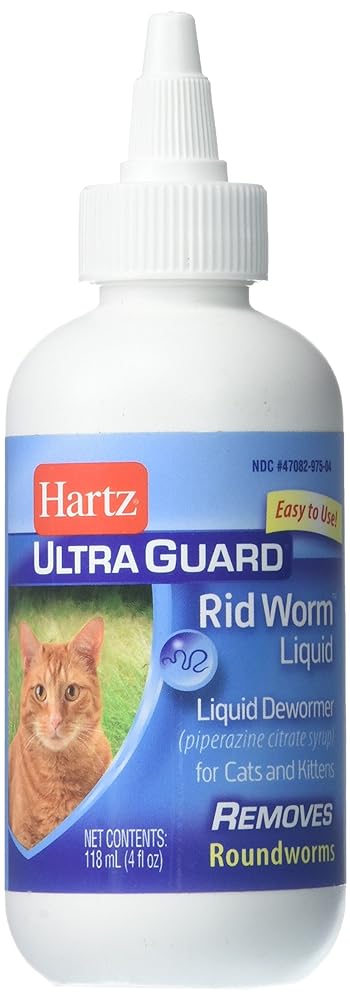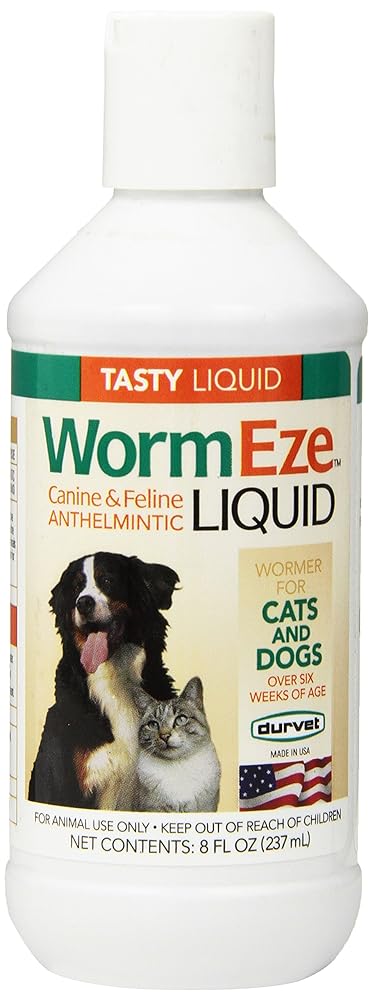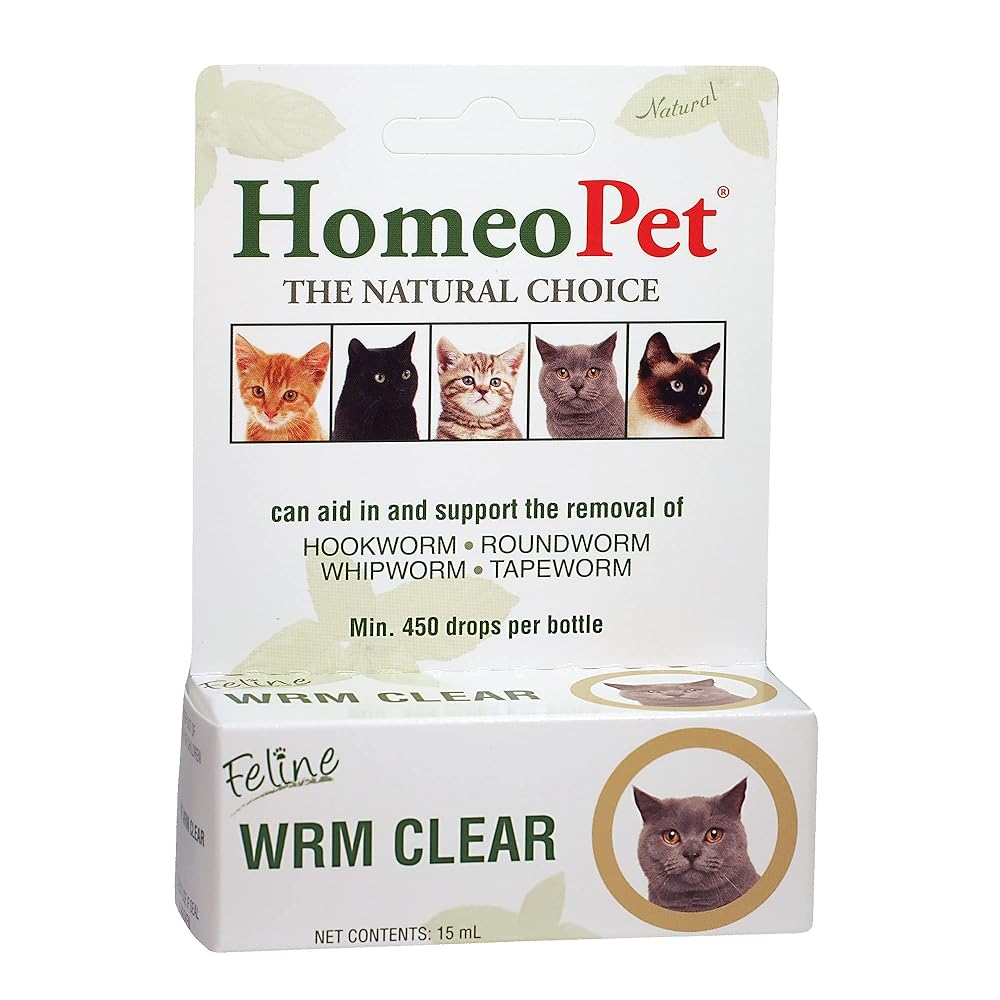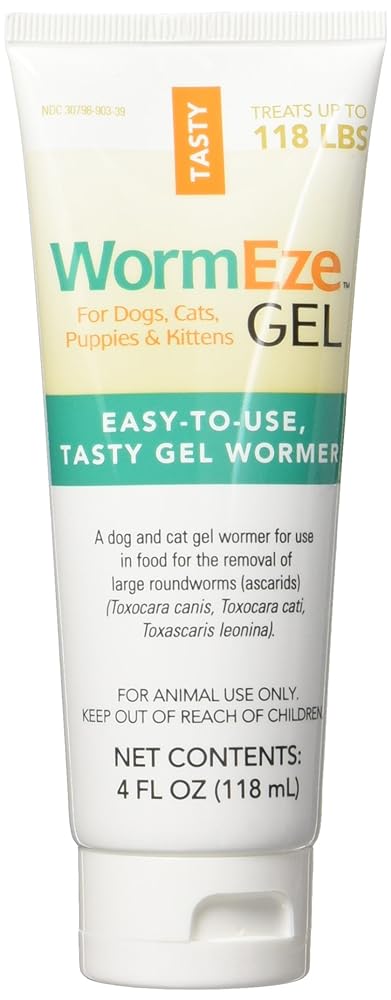iHeartCats is reader-supported. When you buy via links on our site, we may earn an affiliate commission at no extra cost to you.
Worms are not just an outdoor cat’s problem; even indoor cats can be susceptible to various internal parasites like tapeworms, roundworms, and hookworms. These parasites can cause a range of health issues, from mild digestive upset to severe malnutrition and anemia. Knowing the most effective and safe deworming treatments is crucial for any cat owner committed to their pet’s well-being. This article will guide you through the best cat deworming treatments available, taking into account efficacy, safety, and ease of administration.
#1 – Hartz UltraGuard Rid Worm Liquid for Cats 4 oz
The Hartz UltraGuard Rid Worm Liquid for Cats is a dewormer syrup designed to eliminate roundworms in cats and kittens aged 8 weeks and older. It can be administered directly into the pet’s mouth or mixed with food. The recommended treatment includes a follow-up dosage 14 days later for maximum effectiveness.
Best For: Removing roundworms from cats and kittens.
#2 – Durvet WormEze Liquid Canine & Feline Antihelmintic, 8 oz
The Durvet WormEze Liquid is an 8 oz antihelmintic that provides affordable and effective control and removal of large roundworms in dogs and cats of all ages. It is easy to use as it can be added directly to the pet’s water or food. Safe for puppies and kittens over 6 weeks old, this product is very palatable and offers a convenient solution for dealing with intestinal parasites.
Best For: Inexpensive control and removal of large roundworms. (best on a budget)
#3 – HomeoPet Feline WRM Clear, Natural Tapeworm, Whipworm, Roundworm, and Hookworm Medicine for Cats, 15 Milliliters
HomeoPet Feline WRM Clear is a natural worm medicine for cats that helps to remove roundworm, tapeworm, whipworm, and hookworm. The medicine is made from safe and natural ingredients and can work with the cat’s immune system to eliminate intestinal worms. It can be easily administered by dosing it directly into the cat’s mouth or mixing it with their food or water.
Best For: Safe and gentle worm treatment for cats.
#4 – Peak Marketing Pet Wormer Gel, 4 oz (011-06000)
Peak Marketing Pet Wormer Gel is a 4 oz gel that provides inexpensive control and removal of large roundworms, a common intestinal parasite in dogs and cats. It is easy to use as it can be applied directly into the pet’s mouth or mixed into their food. The wormer gel is safe for puppies and kittens over 6 weeks old and is described as very palatable.
Best For: Inexpensive control and removal of large roundworms. (best on a budget)
What Should I Consider When Choosing a Deworming Product for My Cat?
Choosing the right deworming product for your cat involves several considerations:
- Type of Worms: Different dewormers are effective against different types of worms. Knowing the specific type of worm your cat has is crucial for effective treatment. Your veterinarian can diagnose this usually through a stool sample.
- Age and Weight of the Cat: Dewormers often come with age and weight guidelines. Some products may not be suitable for kittens or for very small or large cats, so be sure to select a product appropriate for your pet’s specific needs.
- Formulation: Dewormers come in various formulations such as tablets, granules, liquids, and even injectables. Your choice might depend on how easily your cat takes medication. For example, if your cat is averse to taking pills, a liquid formulation might be easier to administer.
- Frequency of Administration: Some deworming medications require multiple doses or frequent re-administration, while others may only require a single dose. Consider your ability to administer the medication when selecting a product.
- Veterinary Advice: Always consult your veterinarian before starting any deworming regimen. They can provide guidance on the most effective and safest options for your pet, as well as proper dosage and administration guidelines.
- Side Effects: Check if the product has known side effects that could impact your cat’s health. Some dewormers can cause nausea, vomiting, or diarrhea.
- Cost: Prices can vary widely among deworming products. While cost shouldn’t be the only consideration, it’s essential to find a treatment that fits within your budget but doesn’t compromise efficacy or safety.
- Brand Reputation: Look for products from reputable companies that have good reviews from other pet owners and endorsements from veterinarians.
By taking these factors into account, you can make an informed decision that maximizes effectiveness while minimizing potential risks to your cat’s health.
What Are Signs My Cat Might Have Worms?
If you suspect that your cat might have worms, observing their symptoms and behavior is crucial for early diagnosis and treatment. Here are some common signs that may indicate the presence of worms in your cat:
- Vomiting or Diarrhea: Gastrointestinal upset, including vomiting or diarrhea, is a common symptom, particularly if worms are visible in the vomit or feces.
- Weight Loss and Increased Appetite: If your cat is eating more than usual but still losing weight, this could be an indication of a worm infestation affecting nutrient absorption.
- Lethargy and Weakness: Worms can rob your cat of vital nutrients, leading to a lack of energy, lethargy, and general weakness.
- Pot-bellied Appearance: Particularly in kittens, a swollen, pot-bellied appearance can be a sign of a severe worm infestation.
- Visible Worms: Some types of worms, like tapeworm segments, may be visible around the cat’s anus or in their feces. They may look like small, flat, or rice-like white pieces.
- Scooting or Excessive Grooming: A cat that is infested may drag its bottom on the ground (known as scooting) or engage in excessive grooming around the anal area due to discomfort.
- Anemia: In severe cases, particularly with hookworms that feed on blood, your cat might show signs of anemia such as pale gums, shortness of breath, and increased heart rate.
- Coughing: Some types of worms, like lungworms or heartworms, can cause coughing or respiratory issues, although this is less common in cats compared to dogs.
- Changes in Coat Quality: A dull, coarse coat lacking its usual luster can be a sign of poor nutrient absorption due to worms.
- Disturbed Sleep: Worm infestations can cause discomfort, leading to restless or disturbed sleep patterns.
If you notice any of these symptoms, it is essential to consult your veterinarian for a proper diagnosis and treatment plan. The vet may perform tests, such as a fecal exam, to identify the type of worms and recommend an appropriate deworming regimen.
Frequently Asked Questions About Cat Deworming Products
1. How do I know if my cat needs to be dewormed? If you notice symptoms like vomiting, diarrhea, weight loss, or visible worms in the feces or around the anus, it’s a strong indication your cat may have a worm infestation. A definitive diagnosis usually involves a stool sample test performed by your veterinarian.
2. What types of worms can deworming products treat? Different deworming products are effective against various types of worms such as roundworms, tapeworms, hookworms, and sometimes even lungworms and heartworms. Always consult your veterinarian for a proper diagnosis and treatment recommendation.
3. Are over-the-counter dewormers as effective as prescription ones? Over-the-counter dewormers can be effective for mild to moderate infestations but are generally not as potent as prescription options. Prescription dewormers, available through a veterinarian, often offer broader-spectrum efficacy and may be required for severe cases.
4. How often should I deworm my cat? The frequency of deworming varies depending on your cat’s lifestyle, age, and risk factors. Indoor cats may require less frequent deworming than outdoor cats. Consult your veterinarian to establish a deworming schedule suitable for your cat.
5. Can kittens be dewormed? Yes, kittens can and should be dewormed, often starting as early as two weeks of age. However, deworming products for kittens are usually different in formulation and dosage than those for adult cats. Consult your veterinarian for appropriate treatment.
6. Are there any side effects of deworming products? Common side effects can include vomiting, diarrhea, and temporary lethargy. If you notice any severe or prolonged symptoms, consult your veterinarian immediately.
7. Can I deworm my pregnant or nursing cat? Deworming a pregnant or nursing cat requires special considerations and should only be done under veterinary supervision. Some deworming medications are not safe for pregnant or nursing cats.
8. Can I give my cat deworming medication along with other medications or supplements? Some deworming medications may interact with other drugs or supplements. Always consult your veterinarian if your cat is already on medication or supplements before starting any deworming regimen.
9. What is the best form of dewormer? Pills, liquid, or topical? The “best” form of dewormer depends on your and your cat’s preferences, as well as the type of worm being treated. Pills are often more potent but can be difficult to administer, while liquids and topicals might be easier to apply but may require more frequent dosing.
10. Can humans contract worms from cats? Yes, certain types of worm infestations, such as roundworms and hookworms, are zoonotic, meaning they can be transmitted from animals to humans. Proper hygiene and regular deworming of your cat can help prevent this.
Conclusion: Best Cat Deworming Treatments
Deworming is an essential aspect of your cat’s healthcare routine. While many effective treatments can help rid your feline friend of these troublesome parasites, it’s crucial to consult your veterinarian before starting any new medication. They can provide a precise diagnosis and tailor a deworming schedule that best suits your cat’s specific needs. Remember, preventive care is often the best treatment, so regularly consult with your vet to keep your cat worm-free and healthy.





